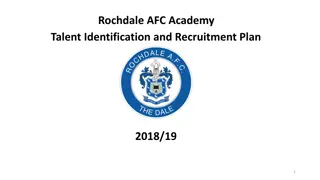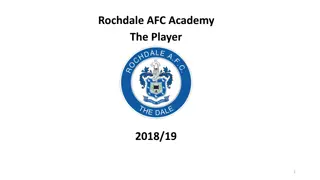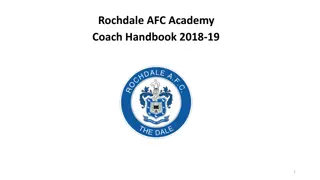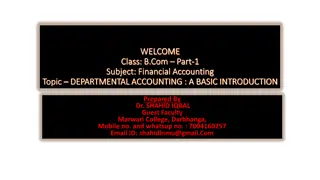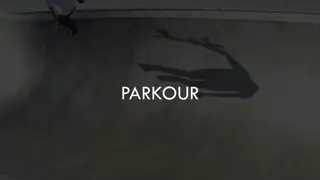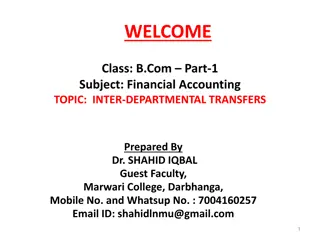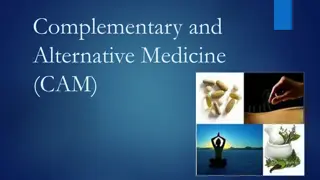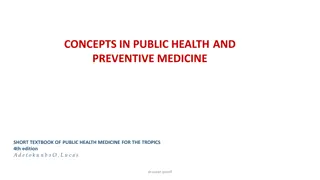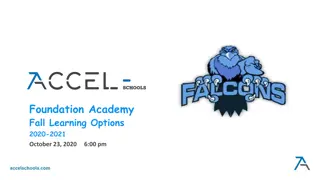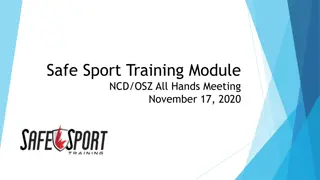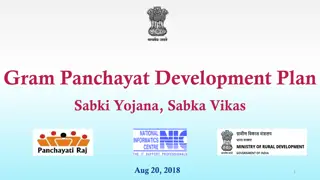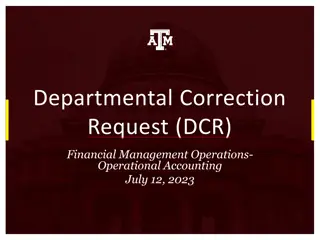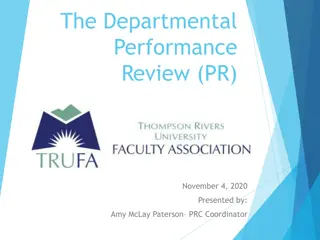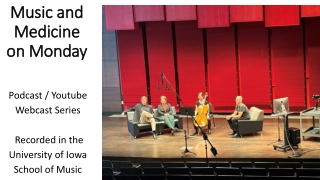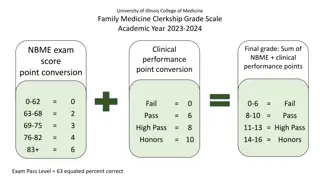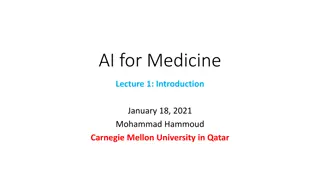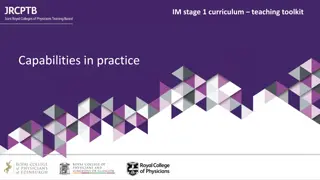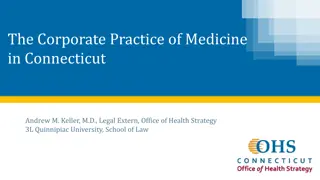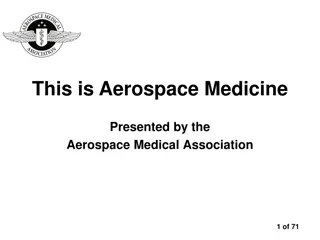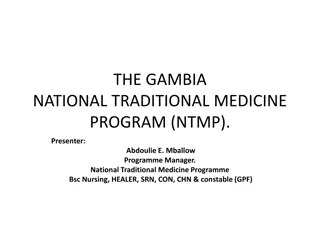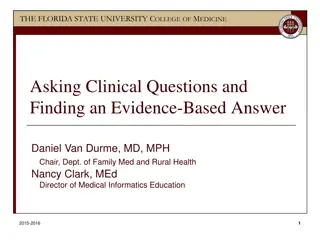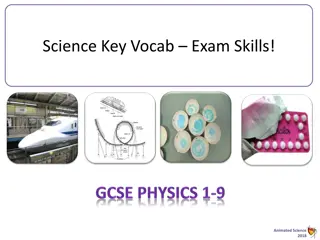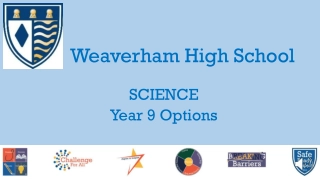Rochdale AFC Academy Sport Science & Medicine Departmental Plans 2018/19
The Rochdale AFC Academy aims to provide elite sports science and medical support services for player development. The departmental plans include areas such as physiology, psychology, nutrition, and injury rehabilitation. Key objectives involve maximizing player performance, using data for individualized programs, and creating a seamless multidisciplinary approach. The vision is to progress the Academy by enhancing sports science services and medical support throughout all phases of the development pathway.
Download Presentation

Please find below an Image/Link to download the presentation.
The content on the website is provided AS IS for your information and personal use only. It may not be sold, licensed, or shared on other websites without obtaining consent from the author. Download presentation by click this link. If you encounter any issues during the download, it is possible that the publisher has removed the file from their server.
E N D
Presentation Transcript
Rochdale AFC Academy Sport Science & Medicine 2018/19 1
Departmental Plan Elite performance support services departmental plan which incorporates principle areas such as; physiology, physiotherapy, soft tissue therapy, psychology, diet and nutrition, strength and conditioning and performance analysis. 2
DEPARTMENTAL PLANS SPORT SCIENCE Steve Wensley / Callum Ryan Jones / Simon Bowles Analysis TBC VISION To progress the Academy by providing elite sports science service throughout all phases of the development pathway, developing a Club-specific approach to sports science support. The development of a full-time department with football scientists at the core of supporting the holistic developmentof Academy players with the use of the Club s own Strength & Conditioning facility. A comprehensive working integration with all other Academy departments for development of the Academy s players & staff. OBJECTIVES - Maximise playing & training time by developing physically robust players. - Develop an understanding of the physical profile of each Academy player. - Ensure all players receive & perform their individual physical development programmes. - Use of season-by-season fitness testing data to individualise both field- & gym-based physical development programmes. - Create physical performance profiles aligned to the Club s positional profiles, philosophy, & DNA. - Observe maturation traits & use maturation data to guide the progression of players through the phases of the development pathway & assist in the informed-decision making processes. - Preparing Academy players for the full-time, professional, playing & training environment. - Managing the consistent intake of sports science interns. - Progression of the Department & staff by creating academic partnerships, using their research insights to inform practices; specifically the development of a Club movement screen to reduce injury occurrence. MEASUREMENT & PERFORMANCE TARGETS - Ensure all Academy players perform physical fitness tests & maturation assessments three times per season. - Provide physical benchmarks for each age group within each phase of the development pathway. - Produce individual long-term player development plans for each Academy player & maximising player contact time & adherence to these plans. - Employ a full compliment of staff. - The notable (through recognised relevant qualifications) development of football scientists . BUDGET IMPLICATIONS - CPD - Qualifications - Maintenance & upgrading of testing equipment - Field- & gym-based equipment - Intern expenditure 3
DEPARTMENTAL PLANS MEDICINE Wes Tensel / Steve Wensley / Callum Ryan Jones / Simon Bowles / Shannon Thomas VISION To further develop the Academy by providing an outstanding Prehabilitation and Rehabilitation service, including Assessment & Treatment, to all players. To develop a fit for purpose staffing model with highly qualified medical personnel, in state of the art facilities using the latest technology and equipment. To provide a seamless multi-disciplinary strategy and communication system. OBJECTIVES Try to increase playing time in minutes on the training ground and pitch for all players To develop an internal communication strategy To produce, analyse and make recommendations from an annual audit of injuries Ensure all players have received annual medical screening Ensure all Emergency Action Plans are in place for all facilities Ensure medical procedures are communicated and followed for all reported injuries Try to improve the department through research and innovation MEASUREMENT & PERFORMANCE TARGETS Analyse 2015/16 & 2016/17 audit of injuries and provide recommendations Produce and communicate a monthly staff calendar and record multi-disciplinary meetings Produce an audit of injuries document and on PMA Submission of the ECG reports and medical questionnaires Produce and distribute EAP s for all facilities Communicate medical procedures at inductions and on the website. Record all injuries on PMA through SOAP notes Develop a research project to improve a specific area of the Medical department BUDGET IMPLICATIONS Increase Clinics = ??? New Medical bags and contents for each age group = ??? Medical Supplies for the season = ??? Licence Maintenance = ??? CPD = ??? Defibs = 0.00 Gases = ??? Stretchers & Board = ??? Electro Therapy = ??? 4
BOARD (BG) + CEO (BG) Academy Secretary (SA) Academy Manager (TE) Head of Sport Science & Medicine Senior Academy Physio (SW) - Doctor (WT/IS) PDP & YDP S & C (CRJ) Academy FP S & C (SB) Ass. Physio (CRJ) Match Analysis (CJ) Ass. Physio (ST) Sport Science & Medical Staffing Model
Emergency Action Plan The Academy Doctor should be responsible for the development of the Emergency Action Plan for both training and games and all Academy staff should be aware of its content. 7
See Documents Below Soccer Factory Matthew Moss 8
Heywood Sports Village Stalybridge Celtic Hopwood Hall College 9
Intra Departmental Integration Practitioners are fully combined into the holistic Academy support team and work closely with other departmental staff at training and at matches. Practitioners operate holistically through effective communication, integration and understanding to facilitate decision-making when planning coaching sessions to provide data required to analyse each player's strengths and weaknesses and structure training sessions with detail and purpose. 10
Medical Screening Testing and interventions are designed and used to identify syndromes, injuries, illness etc., enabling earlier intervention and management to reduce injury and illness occurrence. The range of medical and physiological tests or examinations conducted by a health professional as part of a regular check-up of a player. A prime objective of such screening is to find abnormalities likely to present a risk of injury to the individual, or to detect any condition that would be aggravated by exercise. 11
Medical Questionnaire Please note that all coaching staff are L2EAIF/BFAS qualified and hold medical records for their own age group, this includes details on asthma, allergies and any other condition that they need to know about. 12
Fitness Testing Fitness testing is a way of assessing and recording the physical related components of a footballer s capacity. Testing refers to the exercises carried out in order to establish a comprehensive physiological profile of a player and will be specific and reliable enough to reflect the actual status of specific fitness components of players. 13
Fitness Testing Physical fitness tests are performed three times per season for all phases of the development pathway (PDP, YDP, & FP). Tests are performed at the following stages of each season : - Pre-season (June/July) - Mid-season (December/January) - End-of-season (April/May) The following physical capacities & tests are performed, to establish a comprehensive physical profile of Academy players: - Aerobic capacity: Yo-yo Intermittent Recovery Test Level 1 - Change of Direction: Arrowhead (Right & left) - Acceleration: 0-5 m sprint test - Speed: 0-10 m & 0-30 m sprint test - Power: Countermovement Jump (no arms) See PMA: https://pma.premierleague.com/Sections/Fitness/CustomFitnessTests.aspx 14
National Benchmark Fitness Testing Club comparison of physical and physiological fitness component tests (as defined by BASES, the Premier League or another recognised series of fitness tests). This shall be submitted to the League (upon request) in order to establish a national database of player performance and development. 15
National Benchmark Fitness Testing Rochdale AFC Academy registered their interest in taking full part in the National Benchmark Fitness Testing & Growth & Maturation Projects proposed by the Premier League & Football League (pro forma completed & returned), but have since received no feedback as to the progress of these projects. Rochdale AFC Academy is willing to submit its fitness testing results to the Football League when requested & allow access to the data via PMA. 16
Movement & Physical Screening Kinanthropometry analysis serves as the basis for assessment of movement skills (jogging, sprinting, jumping, landing, twisting, turning under control, receive and give body contact) to measure complex movements. It is used to identify functional movement deficits such as muscular imbalances/asymmetries, flexibility deficits (mobility), balance or stability. 17
Movement & Physical Screening Movement & physical screening is performed in the YDP & PDP. Rather than use commercially available movement screens (i.e., FMS) that do not depict biomechanical differences or assist with the identification of players at increased risk of non-contact injury, RAFC Academy assesses the movement qualities of its YDP & PDP players via a movement continuum (see next slide). This consists of assessing players efficiency & proficiency at performing the following movements: - Squat - Push (upper) - Hinge - Pull (upper) - Unilateral lower This information is then used when designing individual strength & prehabilitation programmes; & is continuously assessed on a weekly basis, by progression or regression within their programme. See personal files & 6/12 weekly reviews. 18
Movement & Physical Screening: Movement Continuum Squat Push Hinge Pull Unilateral Lower Loaded Bulgarian/Step Ups Back/Front Squat Variations Landmine/DB Press Variations Deadlift/RDL Variations Pull Up/Row Variations 5 Landmine Squat Loaded Push Up Deadlift Pull Up Single Leg Squat Variations 4 DB Front Squat Band Push Up Single Leg Hip Thrust Band Pull Up Multi Directional Lunge 3 Goblet Squat Feet Elevated Push Up Hip Thrust Eccentric Pull Up Cossack Squat 2 Box Squat (Goblet) Push Up Eccentric Emphasis BW Single Leg Romanian Bent Over Row Bulgarian 1 DB Sumo Squat Push Up Pause Banded Good Morning Supine Row Walking Lunge 0 BW Squat Press Up Barbell Romanian Supine Row Reverse Grip Reverse Lunge -1 Heels Raised Squat Push Up Hands Elevated Dowel Romanian Bent Over Row Dowel Split Squat -2 Pole Squat Eccentric Only Push Up Wall Romanian TRX Row Step Up -3 Supermans Scap Push Up Hip Bridge Supine Kettlebell Hurdle Drills Under -4 Wall Squat Plank on Hands Glute Bridge Plank on Hands Hurdle Drills Over -5 Supine Squat Plank Lying Leg Raise Plank Unilateral Balances 19
Maturation Measurement Predictive Testing of Size & Shape Qualitative changes in a player s body composition. The major difference to growth is that growth is linked to measureable changes in height, weight and fat percentage, anaerobic endurance, power, speed etc. More biologically mature players often have the advantage of being bigger, stronger or faster and may therefore be more immediately successful, which may result in greater coach involvement. These processes may result in an uneven birth-date distribution in the selection process, which is commonly known as relative age effect (RAE). Predictive Testing of Size and Shape / Maturation Measurement is thus referring to the association of biological maturity with the performance characteristics of growing children and adolescents. It is essentially the prediction of adult stature for the purpose of player development. 20
Maturation Measurement: Predictive Testing of Size & Shape Measurements of maturation are performed at least three times per season for all phases of the development pathway (PDP, YDP, & FP). Tests are performed at the following stages of each season : - Pre-season (June/July) - Mid-season (December/January) - End-of-season (May) The following measurements are taken in order to provide a predicted maturation profile of each Academy player: - Body mass - Standing stature - Seated stature - Leg length From the aforementioned measurements, the following indices of maturation are attained: - Predicted height - Peak height velocity - Age at peak height velocity - Developmental stage See PMA: https://pma.premierleague.com/Sections/Fitness/CustomFitnessTestsSummary.aspx?resultDate=2 4/05/2017 & personal files. 21
Monitoring of Physical Exertion Training & Game Intensity Measuring a player's physical response to testing, training and matches. Measurement of physical exertion can be used to signify and influence training intensities, load and recovery which may help prevent injury and illness. 22
Monitoring of Physical Exertion: Training & Game Intensity Physical exertion is monitored daily for each player within the PDP, measuring training & game load/intensity. PDP players physical exertion is monitored objectively & subjectively using the following methods: - GPS (PlayerTek): performance metrics including total distance, high-intensity distance (distance covered > 18 km.h), sprint distance (distance covered > 25.2 km.h) & top speed. - Rating of perceived exertion: physical exertion scale, 1-10 (1 = rest , 10 = I m going to die ). Post- session / post-game players give a rating between 1 & 10, this is then multiplied by the duration of the session / game to give a subjective physical load for the session / game. See PlayerTek website (go.playertek.com) & personal Excel Spreadsheet 23
Monitoring of Wellbeing Readiness to Train Monitoring each player's mental, lifestyle and physical wellbeing. Mental health, emotional and social well- being focus on how players act, behave, feel, communicate their feelings and co-exist. The positive mental health, emotional and social well-being of players have a profound impact upon their physical, cognitive and football development. 24
Monitoring of Wellbeing & Readiness to Train Player wellbeing & readiness to train is monitored daily in the PDP. The PDP players mental, lifestyle, & physical wellbeing is monitored by: - Wellness Questionnaire (PMA): players answer a series of questions on a 1-5 scale using the PMA application, before or upon arriving at the Club. The PDP players readiness to train is assessed by: - Countermovement Jump (no arms): daily pre-training assessment of lower body power; individual players personal best is used as a reference to compare & assess their readiness to train. See PMA: https://pma.premierleague.com/Sections/Fitness/SurveySummary.aspx See personal Excel Spreadsheet 25
Individual Strength & Conditioning Programme The physical and physiological development of footballer's fitness components regarding analytic power and lactate threshold. The role of strength and conditioning (S&C) is to bridge the gap between sport science theory and applied training; coaching athletes to become faster, stronger and to build their endurance so they perform better and reduce injury occurrence. The focus is on coaching young footballers to move more efficiently through loaded exercises and postural and form corrections. As footballers improve in these areas they should increase their first-step quickness, lateral quickness, explosiveness, deceleration, overall speed and power. 26
Individual Strength & Conditioning Programme Aerobic, anaerobic, & speed qualities are developed within the coaching programmes, with the prescription of SSGs, technical delivery with a physical conditioning focus; & warm-up & SAQ delivery. The physical development of FP players is delivered through the coaching programme & multi-sports, & movement delivery. YDP & PDP players physical development is delivered through the coaching programmes & with individual S&C strength & prehabilitation programmes. Individualised S&C strength-based programmes are designed through a movement continuum assessment (previously described) focussing on five principle movement patterns. See personal files & PMA 6/12 week reviews. 27
Individual Diet & Nutrition Programme Good food choices help ensure needs are met to promote adaptations to training and to aid recovery in order to continue and intensify training, and to ensure good health to reduce illness and injury occurrence. Food and water intake and the holistic education of players regarding what they consume, in order to maximise performance. Personalised nutrition programmes could be prescribed to meet individual needs. This may include meal-planning and dietary supplements, where appropriate. 28
Individual Diet & Nutrition Programme Player & parent nutritional workshops are delivered once per season for each phase of the development pathway, offering advice & guidance on basic nutrition. See PMA: https://plpma.blob.core.windows.net/01000052/Documents/1105412.pdf?sv=2015-04- 05&sr=b&sig=AnfixgwBLPVSWGUvCecSJiIV%2FEwNAIdprLOQlTqCfF0%3D&se=2017-08- 26T09%3A03%3A24Z&sp=r One-to-one consultations are provided, on request for FP players, & for every player from U14s through to PDP. See personal files. 29
Individual Development Plan Schedule Detailed planned training which results in a wide spectrum of player adaptations to various physiological systems. The physiological alterations induced by resistance training will be specific to the individual and the number of sets and repetitions and exercises performed. Special attention is required when developing and recording outputs and outcomes /adaptations to individual's programmes related to the training and testing/screening exercises. 30
Individual Development Plan Schedule Physical-specific development is structured within each phase of the development pathway coaching programmes. In addition, specific physical development sessions are timetabled within the players training hours (field-based) & in addition to the training hours (gym-based). 31
Individual Development Plan Schedule Monday Tuesday Wednesday Thursday Friday Saturday Sunday PDP Subject-to-change according to match schedule, organic ever-evolving. YDP Pre-training: S&C prog. (strength & power). In-session: speed training & SSGs (aerobic/anaerobic) Pre-training: S&C prog. (strength & power). In-session: speed training & SSGs (aerobic/anaerobic) Pre-training: S&C prog. (strength & power). 16s & 15s In-session: speed training & SSGs (aerobic/anaerobic); post-training: S&C prog. (strength & power) 14s In-session: speed training & SSGs (aerobic/anaerobic) Post-training: S&C prog. (speed & power) In-session: speed training & SSGs (aerobic/anaerobic); post-training: S&C prog. (strength & power) 13s In-session: speed training & SSGs (aerobic/anaerobic) Pre-training: S&C prog. (strength & power) FP 12s In-session: fundamental movements 11s 10s 9s 32
Medical Procedures Implemented procedures in case of accident / injury detailing who is responsible for First Aid and rehabilitation decisions from time of injury to a phased and completed return to play. 33
Fit Player Injury Return to training Contact made by parent to physio to arrange appointment S & C Coach Phase Lead/Age Group Coach CRJ/ST/SW Late Stage Rehabilitation Assessment made by Physio CRJ/ST/SW CRJ/ST/SW S & C Coach Mid Stage Rehabilitation Initial Treatment CRJ/ST/SW CRJ/ST/SW Early Stage Rehabilitation CRJ/ST/SW
Medical Personnel Timetable MORNING AFTERNOON EVENING Youth Team SW (8am-1pm) Academy Doc (9am-10am) Youth Team SW(8am-1pm) Youth Team SW (8am-12:30pm) Youth Team SW (3pm-5pm) Monday Tuesday Youth Team SW (1pm-4:30pm) Youth Team SW (12:30pm-4:30pm) Academy & Clinic - FP & YDP CRJ/ST (5pm-9:30pm) Wednesday Thursday Academy & Clinic -FP & YDP CRJ/ST (5pm-9:30pm) Friday Youth Team SW (8am-12:30pm) Youth Team Fixtures SW (8:30am-1pm) (CRJ to support) Aug-May only Academy FP & YDP Clinic ST (9:30am-1pm) Academy Fixtures CRJ Home (8:30am-1pm) ST Home (8:30am-1pm) (SW available for cover) Sept-May only Saturday Sunday 35


